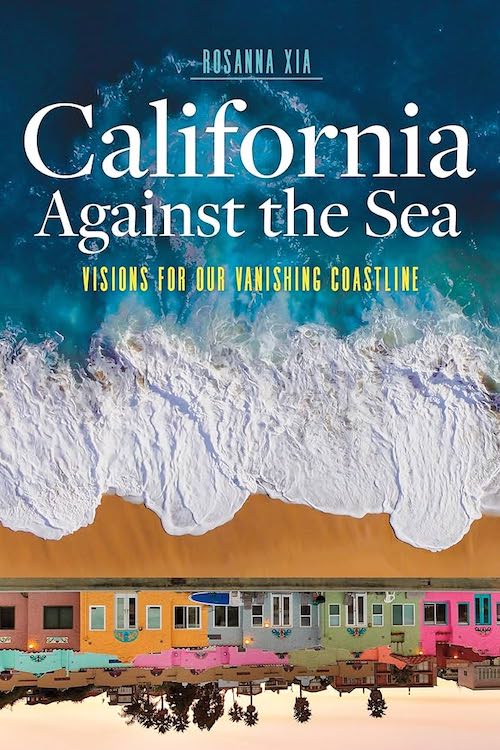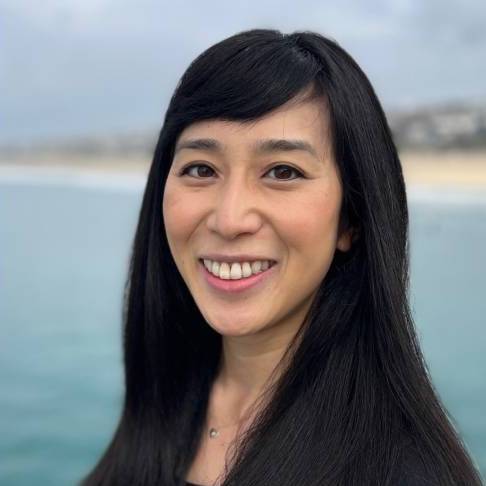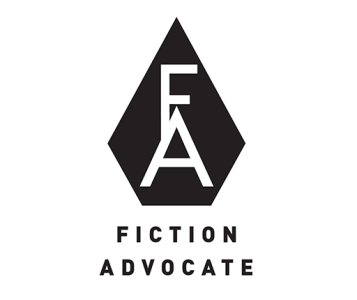
Rosanna Xia is the author of California Against the Sea, which examines the future of our vanishing coastline in the face of rising water. She is also an environment reporter for the Los Angeles Times, where she specializes in stories about the coast and ocean. She was a Pulitzer Prize finalist in 2020 for explanatory reporting, and her coverage of a toxic dumpsite in the deep ocean has been featured in the “Best American Science and Nature Writing” anthology. Originally from Massachusetts, Xia now lives in California.
EB: When I started this series, I was thinking about “non-humans” as animals specifically, but the more I read and spoke to people who write about “non-humans” I realized that “non-humans” can be plants, mushrooms, aliens, and even, in your case, the ocean.
RX: I love the idea of the ocean as a non-human being—it’s alive, right? That realization was really transformative for me. I went on a journey from a reporter who writes about the coast, to someone who was trying to write a book about this landscape and engage with it on a deeper level. My amazing brilliant compassionate editor Marthine Satris was the one who pointed out how the ocean itself was absent from the first draft of my book—she got me to start thinking about the ocean itself as a character and how to give it its own voice.
One of the major themes of the book is resetting our relationship with the ocean. So many conversations around sea level rise make it seem like we are at war with the ocean—we have to defend ourselves, build a wall against the rising water. But it doesn’t have to be that way. Marthine pushed me to become more deeply attuned to the ocean’s presence in all these conversations about our future. After a particularly tough edit, she gave me a book called Adjust the Level of the Sea by David Horvitz. The entire book is just one poem “composed of 156 waves of thoughts and actions to be realized in contact with the sea,” and there is this one line that just gave me goosebumps: “see the sea, be seen by the sea.” That was when I realized I needed to go way deeper, not just in how we see the sea, but also considering how small and inconsequential we must look like to the sea. I mean, what we see of the ocean is just the very edges of it—standing on land, looking at the Pacific from the beach, how can you capture the vastness and awe and wonder and also its power?
EB: Your book changed my thinking about the ocean! Just the bit alone about the ocean not being something we need to fight but that we could work with—like why not build floating cities? We already know how to build boats that float.
RX: Exactly. How can we actually embrace it and work with it?
EB: Right. Which makes me wonder: while your writing is primarily about a “non-human” it is really about the relationship between humans and non-humans. How did you make sense of all the different human perspectives and opinions along the coast that were so often in conflict with each other?
RX: I think about these different perspectives as part of a chorus of voices that are all these different pitches and harmonies and chords. All these voices come together to create a complex song, and you want as many notes as possible to compose something that is truly complex but also harmonious. But there are also points of tension in music as well. That is what’s driving what we’re feeling forward. So, yeah, I think it all starts with listening and not coming in with too much of a prescribed sense of where this person’s perspective belongs in the story. It also helped that I had literally no structure for my book in mind going into writing it [laughter].

EB: Wow, I love what you said about tension in music as a metaphor—I had a professor in grad school who said writing nonfiction was like trying to make music out of sounds you collect from a loud, busy street, while writing fiction is like composing music in a silent room. But the thing about tension is so true. I always think it’s much more interesting when writers present two people with differing opinions in a story and show how both perspectives are valid.
RX: Right. I also wanted to bring to life all the different people who live on the California coast. It’s easy, for example, to imagine some super wealthy person who owns a mega-million-dollar mansion, but instead I got to know a woman who spent her whole life saving up to buy the ugliest house on the prettiest street in town only to find out, shortly after she moved in, that her house could be underwater at some uncertain point in the future. I went out of my way to find voices that would add more complexity to the story rather than reinforcing the oversimplified ways we often think about this issue.
My editor at The LA Times once joked that if, after an article comes out, every single person quoted in it is a little bit unhappy with the story, then that means you were fair. But then I got to thinking: if everyone felt heard, that is also fair. That’s how I approached the book: I wanted to make sure everyone felt heard, even if they might not agree with everything in the book.
EB: Has writing about “non-humans” changed your relationship to the natural world in any way?
RX: To be an environmental reporter you need to know such a mishmash of so many things—it’s science, yes, like plants and animals and understanding ecology, but it’s also politics, land use policy, zoning, going to planning commission meetings, navigating the National Environmental Policy Act and the Clean Water Act, and then all the local and statewide versions of these laws. It’s also history and understanding how we’ve sacrificed some communities for our industrial needs while privileging others.
This is a long-winded way of me saying that what changed for me is realizing that our relationship to the environment is actually a story about all the systems—social, economic, political—that have gotten us into the situation we are grappling with today. Environmental change is inseparable from social change, and you can’t write about one without writing about the other.
EB: Reading your book I was thinking a lot about Boston—I grew up in and still live in Massachusetts—and how so much of what is now the city used to be marsh and wetlands, and it got filled in and buildings were built on top. Marsh and wetlands are natural protections against storm surges and sea level rise, and we got rid of them, and now we’re mad that the ocean is damaging these things we built.
RX: I grew up in Massachusetts! Something I think is so interesting is how access to the beach in Massachusetts is not the same as it is in California. We have this really unique state law in California—the Coastal Act of 1976—that declares that the shoreline is this broader public good, and there’s no such thing as a private beach. So, having access to the beach is a fundamental right to all Californians and all members of the public. It’s incredible in California having this connection with the ocean that feels inseparable from your own identity.
Meanwhile, in Massachusetts, going to the beach can be such an ordeal unless you know someone who has a house on the Cape or Martha’s Vineyard. Growing up, my family and I didn’t end up going to the beach all that often, and now I still have to pinch myself because I get to go to the beach all the time for work.
EB: That’s so interesting. Also, I always love meeting a fellow Masshole.
RX: A fun fact about me is that I learned how to swim in Walden Pond.
EB: Okay, sorry, Massachusetts tangent! Anything else about your relationship to the coast and the ocean?
RX: I really wanted the book to go beyond the old school approach to nature writing, which often treats nature as this sacred sanctuary that is pristine and separate from us. I wanted to make sure it was clear that we are not separate from nature, we are part of nature. We all live on this planet and have a responsibility to take better care of it.
EB: So true. Nature is everywhere—even in cities, suburbs. It’s like how during the pandemic all of a sudden everyone noticed the birds for the first time and now birding is in vogue. This is a moment where we can reevaluate and change… if we want to.
RX: Exactly.
EB: So, why do you think it is important that humans read and write about non-humans?
RX: Climate change can be scary, but it is also an opportunity to really take a moment and think: Is the status quo today what we actually want to protect and defend at all costs, or should we consider unwinding some of the systems that got us into this mess in the first place? And is it possible to start reimagining and reconsidering what we actually want for our future?
Ultimately, my hope with this book is that it will start and deepen a conversation that we so desperately need to have. People often ask me, “What can I do about climate change?” and a first big step is to truly start talking about it.
EB: I’m so glad you said that. It can be so easy to get overwhelmed by the prospect of climate change and just be paralyzed and not able to do anything. But just starting with talking about it feels manageable.
RX: It’s so important to not approach these issues with only doom and gloom. Even looking at the cover—there could have been so many ways to illustrate it, like with a massive wave crushing California—but I think just because climate change is upon us doesn’t mean it has to end in disaster.
EB: What do you think are the biggest challenges and rewards are of writing nonfiction, both in general and about “non-humans” in particular?
RX: When I first started working at the L.A. Times, a senior reporter told me that you can be a great reporter and a terrible writer and still be good at your job, but if you are a great writer and a terrible reporter you’re not going to get far. In journalism, your writing is only as good as your material, so the reporting is more than half the battle. If you don’t tackle the tough conversations and overcome the research, you won’t have anything to write about.
Though the writing part is hard. My first drafts are usually just word vomit. I’m a better editor than I am a writer, so I consider my first edit my actual first draft. And in writing this book in particular, there are only so many words for the sea! Water, ocean, sea—that’s about it. Then there is coast, coastline, shore, shoreline. It all just felt very repetitive, and it took a lot of line-by-line agonizing to switch up the wording, vary the rhythm, and play with the cadence. One really helpful book I swear by is Several Short Sentences About Writing by Verlyn Klinkenborg.
EB: Who are some other writers that you admire? Especially any who write nonfiction about non-humans?
RX: Ah, there are so many, but I want to shout out Lucas Bessire and his book Running Out: In Search of Water on the High Plains. He is such a stunning writer, and my mind also just jumped to Susan Orlean. I loved The Library Book—a library is a non-human too, right?
EB: Totally. Susan Orlean also writes a lot about animals, too. Finally, who are the non-humans in your life right now?
RX: I don’t have pets, but I do hike pretty regularly. I love this one hike—Temescal Canyon in the Santa Monica Mountains. It’s pretty quick and takes you up to the ridge above the ocean and then back down through the canyon, and I just love all the microclimates that you experience going from the coast to the canyon. It never feels the same twice. People say there are no seasons in Los Angeles, but there are if you take the time to look for them. It’s really grounding for me every time I go, and every time it reminds me of how important it is to pay attention to your surroundings.
